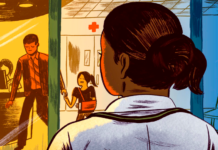To Live and (Almost) Die in L.A.: A Survivor’s Tale
After 25 years of chronic emergency, 22 mental hospitalizations, a stint at a “community mental health center,” 13 years in a "board & care," repeated withdrawals from addictions to legal drugs, and a 12-year marriage, I plan to live every last breath out as a survivor, an advocate, and an artist.
In Memory of Julie Greene
With deep regret, Mad in America announces another loss in our contributor community. Julie C. Greene, writer and antipsychiatry advocate, lost her battle with kidney disease on November 29 at her home in Beaver Falls, Pennsylvania. Julie had been an MIA blogger since 2014, including several pieces on the dangers of lithium.
People Diagnosed with Bipolar Disorder at Increased Risk for Parkinson’s
Increased Parkinson's risk could be related to lithium, antipsychotic, and antiepileptic drug use.
Lithium: A Survivor’s Guide for Parents
When I was a young adult, I was misdiagnosed with bipolar disorder and placed on lithium. I am 61 years old now, living on the edge of end-stage kidney disease. If I could undo everything, by all means, I would not have taken this drug. It is not safe for anyone at any age.
Prenatal Valproate Exposure Linked with ADHD Diagnosis in Children
Children who were exposed to anti-seizure drug valproate in utero were 48% more likely to develop ADHD, according to a new study.
The Good, the Bad, and the Ugly: An Infographic on Bipolar Drugs
Bipolar drug therapy is a balancing act of benefits vs. harms. Odds of attributable benefit cluster in a 15-25% band, so 75%-85% don’t see substantial benefit. Stated differently, if five people take a bipolar drug, only one is likely to see substantial improvement due to it, but all five will have side effects.
Study Explores Connections Between Diet and ‘Serious Mental Illnesses’
Study finds that individuals diagnosed with schizophrenia, bipolar disorder, and depression have diets that are more inflammatory and higher in calories.
Gradual Tapering is Most Successful for Withdrawal from Antipsychotics
Mixed-Methods study explores the experiences of antipsychotic discontinuation among service users.
Valproate Linked to Decreased Brain Volume in Children Diagnosed with Bipolar Disorder
Researchers find that valproate decreases brain volume in a region associated with emotion processing across all participants.
Reappropriating Bipolar Beyond Pathology
It’s still not easy for me to say, “I’m bipolar.” Know that I’m bipolar for good reason, reappropriating a painful word, so those in pain can find me—so you can find me. This is how I reappropriate a term used to strip me of my humanity, a term used to sell me counterfeit versions of reality. I refuse to let go of a label that helps me find my people, no matter how painful it is to retain.
The Shamanic View of Mental Illness
From UPLIFT: In the shamanic view, emotional distress and psychosis signal a spiritual awakening or emergence, not a pathology. Western cultures can learn a great...
Psych Ward Ramblings
In this piece for Medium, activist and survivor Louisa J. Harvey describes the experience of being locked in a psychiatric institution on an involuntary hold.
"This is not...
What Care for the Criminally Insane Can Teach Us
In this piece for The Pew Charitable Trusts, Michael Ollove reports on Oregon's model of intense care and supervision for those found guilty except for insanity.
"Oregon’s model...
The Breaking Point
How did I become someone who could barely function? I was a high-performing sales executive ranked in the top 2% of an international business communications company. But now, after using powerful psych meds for depression and anxiety for more than a decade, I couldn’t do basic things like go to the grocery store, plan a meal, make dinner, or get together with friends.
Bright Light Therapy More Effective Than Medication Alone for Bipolar Depression
A new randomized, double-blind, placebo-controlled trial has found bright light therapy to be a powerful intervention that could provide an alternative to medication for people with “bipolar depression.”
Popular Drug Reveals the Issue of “Off-Label” Use
From The Washington Post: Despite major lawsuits and detailed reports pertaining to severe health risks associated with the antipsychotic Seroquel, the drug remains one of...
How the Human Stress Response Explains Away “Bipolar Disorder”
Here we'll take a look at so-called 'mania.' We'll go through the criteria for a 'manic episode' symptom by symptom so you can see how the stress response is potentially operating. There's practically nothing that happens in human minds and bodies that the stress response doesn't potentially affect.
Existential Therapy Assists Patients Withdrawing From Psychiatric Drugs
Confronting existential anxiety through “Basal Exposure Therapy” shows promising results in people withdrawing from psychotropic drugs.
Research Is Shedding New Light on Hearing Voices
From Psychology Today: Although auditory hallucinations are commonly thought of as a sign of mental illness, research shows that hearing voices is common among the general population...
Changing Mental Health, One Published Case Report At A Time
Lifestyle interventions are the only corrective measures that are sufficiently complex to resolve the stress response factors that drive pathology. This case draws from twenty years of published scientific literature on psychoneuroimmunology and the connection between the gut, immune system, endocrine system, and the brain.
Art and Images in Psychiatry
Between 2002 and 2014, JAMA Psychiatry published monthly essays by Dr. James C. Harris exploring the role of visual arts in representing emotional distress, trauma, life...
Medicine Can Soothe a Troubled Mind, but Not Without Costs
From The New York Times: In a new book, Blue Dreams, psychologist and patient Lauren Slater critiques the drug-based model of psychiatric care, debunking the chemical...
We Need to Encourage People to Make Advance Directives
In this piece for STAT, Jennifer Adaeze Okwerekwu describes the value of psychiatric advance directives for those at risk of experiencing an emotional crisis.
"'It’s something that can...
Study Explores Meanings of Bipolar Disorder to Those Diagnosed
The narratives about Bipolar Disorder promoted by drug companies may influence how those diagnosed understand themselves.
Experts Stress Importance of Social Networks for Psychosis and Bipolar Interventions
Researchers develop a novel approach to mapping personal well-being networks for those diagnosed with severe mental illness (SMI) that incorporates social ties, connections to place, and meaningful activities.

































